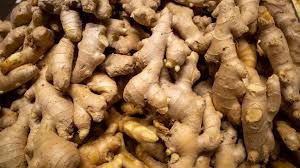Nigeria’s Ginger Crisis: From Global Leader to Market Outcast — And How to Reclaim the Crown.
By Dr. G. Fraser. MFR.
The National Patriots.
In 2015, Nigeria proudly ranked as the world’s third-largest ginger producer, trailing only India and China. The spice, known for its rich aroma and high oil content, was a prized export to Europe, the Middle East, and Asia, generating millions in foreign exchange and supporting hundreds of thousands of rural farmers.

Today, that story has soured. Nigerian ginger exports have collapsed, and even local buyers are turning away. The cause: a blight outbreak that blackens rhizomes, traced by farmers to “improved” GMO ginger seeds and pesticides supplied under an international grant program. The inputs, marketed as yield-boosting and quality-enhancing, were adopted eagerly, but instead, they coincided with the disappearance of Nigeria’s indigenous ginger variety and the spread of a devastating fungal disease.

From Pride to Plight — The Historical Arc
- Pre-2015: Nigeria’s ginger (notably the Southern Kaduna variety) was globally competitive for its pungency, high oleoresin content, and adaptability to local soils and climate.
- 2015 peak: FAO data put Nigeria’s annual output at ~522,000 tonnes, exporting over 60% in dried, split, or powdered form.
- Post-GMO introduction: Reports of rhizome blight emerged within seasons; local landraces dwindled as farmers replaced seedstock.
- 2023–2025: Export orders plummeted; EU and Middle Eastern buyers shifted to Ethiopia and India for a reliable supply.

Accountability Gap — Could This Have Been Prevented?
Under Nigerian law, the National Agricultural Seeds Council (NASC) and the National Biosafety Management Agency (NBMA) must approve any GMO seeds before use. Similarly, pesticides fall under NAFDAC registration. Yet, farmers report these “grant” products were distributed without visible regulatory vetting. In most major agricultural economies, such as:
- India: All seed imports undergo multi-season, multi-location trials before approval; GMOs require Genetic Engineering Appraisal Committee clearance.
- EU: Strict GMO bans for certain crops; phytosanitary checks at borders; severe penalties for unapproved seed distribution.
- USA: USDA-APHIS, EPA, and FDA coordinate to assess biotech crops and pesticides; distribution without approval can lead to federal charges.
Nigeria’s lapse here was not in lacking agencies but in failing to enforce procedures.

Damage Control — A Roadmap
Immediate containment:
- Ban and recall the suspect GMO seed lines and associated pesticides.
- Conduct nationwide rhizome testing to isolate blight-free zones.
Revival of indigenous variety:
- Launch a National Ginger Rescue Program to reintroduce the original Kaduna genotype from preserved seed banks (e.g., IITA or international germplasm repositories).
- Partner with Ethiopia and India for disease-free planting material while indigenous stock is regenerated.
Farmer retraining:
Establish extension services to teach phytosanitary measures, crop rotation, and organic fungicide protocols to curb blight spread.
Export market re-entry strategy:
- Begin with small, certified organic lots for niche high-value buyers to rebuild the reputation.
- Use branding (“Kaduna Gold” or “Nigerian Pungent”) to differentiate once quality is restored.

How Long to Reclaim Leadership?
- Short-term (1–2 years): Contain disease, ban harmful inputs, and secure clean planting stock.
- Medium-term (3–5 years): Achieve consistent, high-quality harvests in blight-free zones; re-enter select export markets.
- Long-term (5–7 years): Scale to pre-2015 output levels; regain top-three global status through aggressive marketing, quality certification, and government-backed trade deals.

Comparative Perspective: Recovery is Possible
- Ethiopia: Overcame a coffee wilt crisis in the 1990s by replanting with disease-free seedlings from research stations, reclaiming export share within 6 years.
- Vietnam: After the citrus greening disease, it re-entered global citrus markets in less than a decade through strict nursery regulation and international partnerships.
These show Nigeria’s path is difficult but not impossible—if political will and farmer cooperation align.

The Call to Action
Nigeria cannot afford to lose another globally competitive crop due to weak oversight. The Ministry of Agriculture, NASC, NBMA, and NAFDAC must investigate, hold distributors accountable, and legislate tougher penalties for unapproved seed and chemical introductions. A coordinated rescue plan can restore the nation’s reputation — and put Nigerian ginger back where it belongs: at the top of the world’s spice market.
Ginger made Nigeria a spice powerhouse once. With decisive action, it can again.
Headlinenews.news Special Publication ©️




